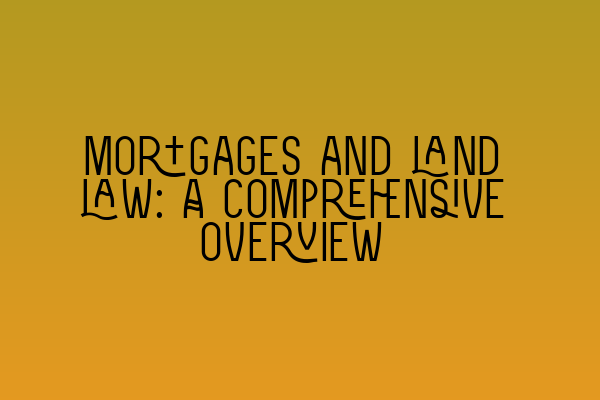Mortgages and Land Law: A Comprehensive Overview
As a leading solicitor firm specializing in property law and land law, we understand the complex intricacies of mortgages and their relationship to land law. In this blog post, we will provide you with a comprehensive overview of mortgages and land law, covering the key concepts and legal principles involved. Whether you are a solicitor, law student, or simply someone interested in gaining a deeper understanding of these subjects, we hope this article will prove to be informative and engaging.
Before delving into the finer details, it is important to understand the basic definition of a mortgage. A mortgage is essentially a legal agreement between a borrower and a lender, which allows the borrower to obtain a loan for the purchase of property while using that property as security for the loan. In other words, a mortgage grants a lender a right to take possession of the property if the borrower fails to repay the loan as per the agreed terms.
Now, let’s explore some of the key concepts and legal principles associated with mortgages and land law:
1. Creation of Mortgages:
– A mortgage is created through a legally binding document called a mortgage deed.
– The mortgage deed outlines the terms and conditions of the loan, including the repayment schedule, interest rate, and any other relevant provisions.
– It is important to note that a mortgage can only be created for legally recognized interests in land.
2. Types of Mortgages:
– There are several types of mortgages, including fixed-rate mortgages, variable-rate mortgages, interest-only mortgages, and buy-to-let mortgages, to name a few.
– Each type of mortgage comes with its own set of advantages and disadvantages, and borrowers should carefully consider their options before making a decision.
3. Priority of Mortgages:
– When multiple mortgages exist on a property, the priority of each mortgage determines the order in which they will be satisfied.
– Generally, the first mortgage registered on the property will have the highest priority, followed by subsequent mortgages in chronological order.
– This concept is of utmost importance for lenders and borrowers, as it impacts their rights and remedies in case of default.
4. Rights and Obligations of the Parties:
– A mortgage creates a legal relationship between the borrower (mortgagor) and the lender (mortgagee).
– The borrower has an obligation to make the agreed-upon mortgage payments and keep the property in good condition.
– The lender has the right to enforce the terms of the mortgage, including the right to take possession of the property in case of default.
5. Foreclosure and Repossession:
– If a borrower fails to make timely mortgage payments, the lender has the right to initiate foreclosure proceedings.
– Foreclosure involves the sale of the property in order to satisfy the outstanding debt.
– The specific rules and procedures for foreclosure vary depending on the jurisdiction, and it is vital to understand the applicable laws in each case.
Now that we have outlined the fundamental aspects of mortgages and land law, it is essential to realize the significance of staying updated with the latest legal developments and regulatory changes. SQE Property Law & Land Law offers a wide range of preparation courses for SQE 1 and SQE 2, ensuring that solicitors and aspiring law professionals have access to comprehensive resources to enhance their knowledge and succeed in their respective fields.
To further enhance your understanding, we recommend exploring our related articles, such as SQE 1 Practice Exam Questions, SQE 1 Practice Mocks FLK1 FLK2, SQE 2 Preparation Courses, SQE 1 Preparation Courses, and SRA SQE Exam Dates. These articles provide valuable insights and resources to assist you in your legal journey.
In conclusion, mortgages and land law are complex subjects that require a thorough understanding of legal principles and concepts. Whether you are involved in property transactions, pursuing a career in law, or simply interested in expanding your knowledge, it is essential to grasp the intricacies and implications of mortgages within the context of land law. By staying informed, seeking expert guidance, and continuously updating your knowledge, you can navigate these legal matters with confidence and ensure favorable outcomes for your clients and yourself.
[LINKS TO RELATED ARTICLES:
1. SQE 1 Practice Exam Questions
2. SQE 1 Practice Mocks FLK1 FLK2
3. SQE 2 Preparation Courses
4. SQE 1 Preparation Courses
5. SRA SQE Exam Dates]
